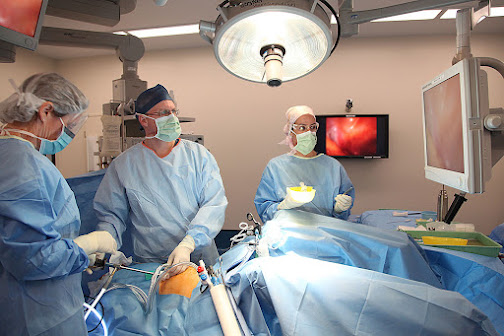Laparoscopic Surgery Evaluation and Technical Base
Centers Approval
The well-being of
patients with surgical conditions will depend on the quality of care provided.
Although it is true that the concept of quality and the parameters to measure
it are a currently debated topic as it implies multiple views of it. No one
doubts the importance of quality assurance programs in the practice of surgery.
Laparoscopic surgery is an inseparable part of general surgery and its
indicators of morbidity and mortality should be evaluated with greater rigor
and systematically because it is more complex. Simulations of laparoscopy is
significant choice resembling Laparoscopic
Needle Holder.
Only 3 years ago,
Cushieri wrote about this: «while the incidence of important iatrogenic
problems has been reduced, iatrogenesis is still present and causes the death
of young patients still to take place as a result of laparoscopic surgery
performed by processes benign. '
Quality of The Processes
There are published
papers that show series of 5,000 or more patients operated by laparoscopic
cholecystectomy with low rates of bile duct lesions. However, it must be taken
into account that in our hospitals, these interventions have generally been
performed by a small group of surgeons in the surgical services, who have
achieved great experience and improvement of the technique.
However, due to the
high frequency of gallbladder disorders in our environment and the increasing
number of surgeons who can perform it electively and also in emergency
services, then the complication rates may increase, if adequate measures are
not taken to control the quality of the processes.
Evaluation of Laparoscopic Surgery
With the basic set
of instruments, in addition to the cholecystectomy, other surgical
interventions with this approach can be performed. Taking into account that
level III hospitals already have this equipment and in the future a greater
number of them may be increased, and where not all have the same conditions. It
is necessary to create an accreditation system as to what type of interventions
can be performed in each of the country's hospital centers, since as it is a
more complex surgery than conventional surgery and its evaluation must be more
rigorous.
The accreditation
system of the centers, whose objective is to address the safety of the patients
as much as possible, must take into account in the same way as in conventional
surgery: the experience of the surgeons, the technological equipment available
and the hospital infrastructure that it has.
It is understandable
and we are all used to open surgery because in order to perform complex
surgeries, the institution must be prepared to immediately guarantee any trans
or postoperative complication that may arise, and it is essential that the
institution has emergency diagnostic means, rooms of intensive care,
availability of blood and blood products, as well as surgical guards and physical
anesthesia 24 hours a day, among others.
Surgical Technique with Technological Base
As a surgical
technique that is strongly supported by a technological base, which is
otherwise constantly renewed and is extremely expensive, for a country like
ours with not great resources, the progressive staging of technology will be,
in my view, the fundamental basis for its development.
Complex advanced
surgery cannot be performed with basic instruments and for it special
instruments and equipment are essential that surely They will not be able to be
acquired massage, as happened with basic laparoscopic surgery. Level hospitals,
which were designed for this purpose, should be the first to have cutting-edge
technologies and play a predominant role in the future, as centers for training
and dissemination of this surgery, as they have been for many years in open
surgery.
For more information visit our website: www.gerati.com




Comments
Post a Comment